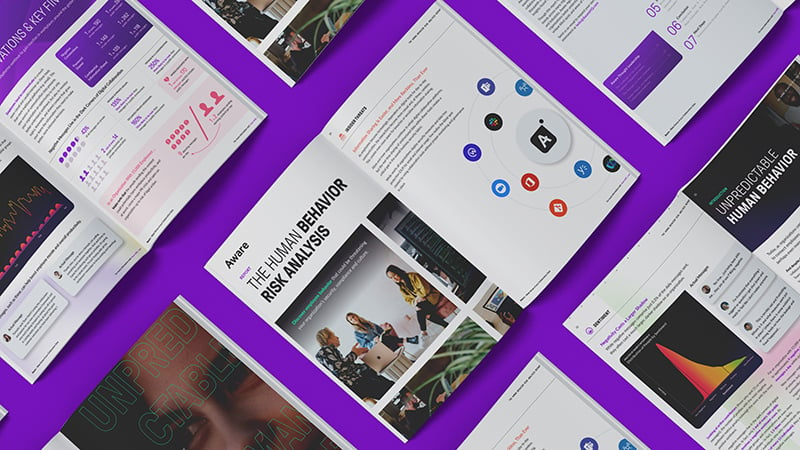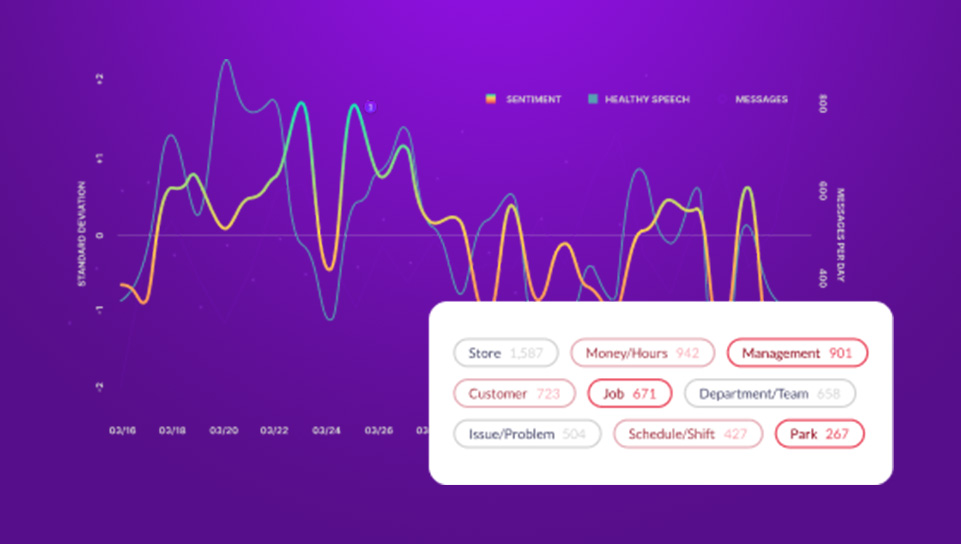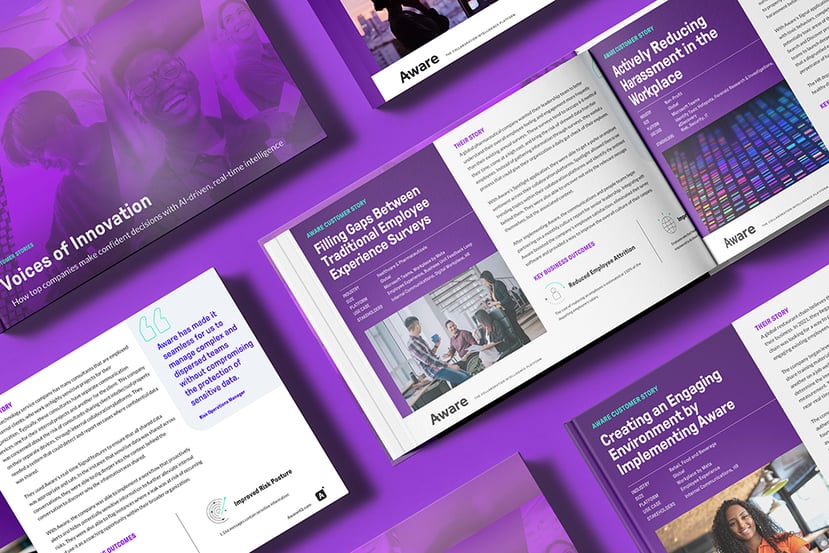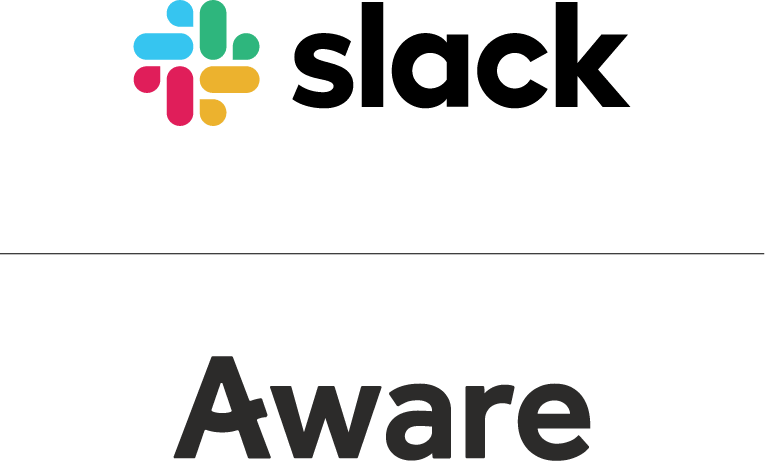Slack Sentiment Analysis: How It Works and Why You Need It
by Aware
Employee engagement surveys are valuable tools for understanding the mood of your workplace, but they only measure a single point in time. Using Slack, today’s leaders can take a continuous pulse of their organization and understand how sentiment fluctuates in real time. Slack sentiment analysis is the new frontier of employee engagement, helping executives enhance morale and increase retention.
Contents
- What is sentiment analysis?
- Sentiment analysis use cases
- Is sentiment analysis helpful?
- How top companies leverage sentiment analysis to create business value
- How does Slack sentiment analysis work?
- Does sentiment analysis have any limitations?
- Slack sentiment analysis FAQs
- What is sentiment analysis in Slack channel?
- How is Slack used for analytics?
- How do I analyze Slack app data?
- Do Slack analytics include DMs?
- How do I know if Slack is being monitored?
- How do I find the sentiment of a Slack message?
- What are the benefits of sentiment analysis for Slack?
- How do I track Slack sentiment analysis?
- Slack sentiment analysis from Aware
What is sentiment analysis?
Sentiment analysis, or opinion mining, involves using natural language processing (NLP) AI to evaluable the emotion or meaning behind written text. In the context of Slack, this means understanding the sentiments expressed in messages to gain insights into employee morale and satisfaction. The business uses of sentiment analysis are diverse and extend far beyond understanding employee communications.

Harness your organization's collaboration sentiment data
Sentiment analysis use cases
Sentiment analysis has a wide range of applications in the workplace, including:
- Understanding employee sentiment: By analyzing Slack conversations, companies can gain valuable insights into employee morale, engagement, and satisfaction. This information can be used to identify areas for improvement, address employee concerns, and foster a more positive and productive work environment.
- Identifying workplace trends: At an aggregate level, analysis of sentiment trends from passive listening can help executives identify areas of the business where morale is low, frustrations are high, and toxicity festers. By identifying these core areas—and surfacing the topics that drive low sentiment—businesses can take a proactive approach to protecting their company culture, improving their brand reputation and increasing employee retention.
- Measuring the impact of changes: Slack analysis can be used to measure the impact of changes, such as new policies, procedures, or initiatives, on employee sentiment. This information can be used to evaluate the effectiveness of these changes and make adjustments as needed.
- Resolving problems in real time: Hosting an important company meeting but not everybody can join the call? Rolling out a new tool and want to ensure nobody is left behind during training? Slack chats are a first resort for many employees seeking technical help and support, meaning real-time sentiment analysis can highlight systemic problems as they occur.
Is sentiment analysis helpful?
Sentiment analysis can be an extremely powerful way of understanding how the workplace runs and the topics that have the greatest impact on employees in real time. Without sentiment analysis, leaders must rely on slow surveys that can introduce bias or wait until employees raise problems and advocate for themselves. Sometimes the first executives hear of problems plaguing the business is when they begin to hemorrhage good employees.
Understanding employee sentiment enables companies to proactively address challenges and create a supportive work environment. Moreover, tracking sentiment signals to employees that their opinions matter, fostering better productivity, communication, and transparency.
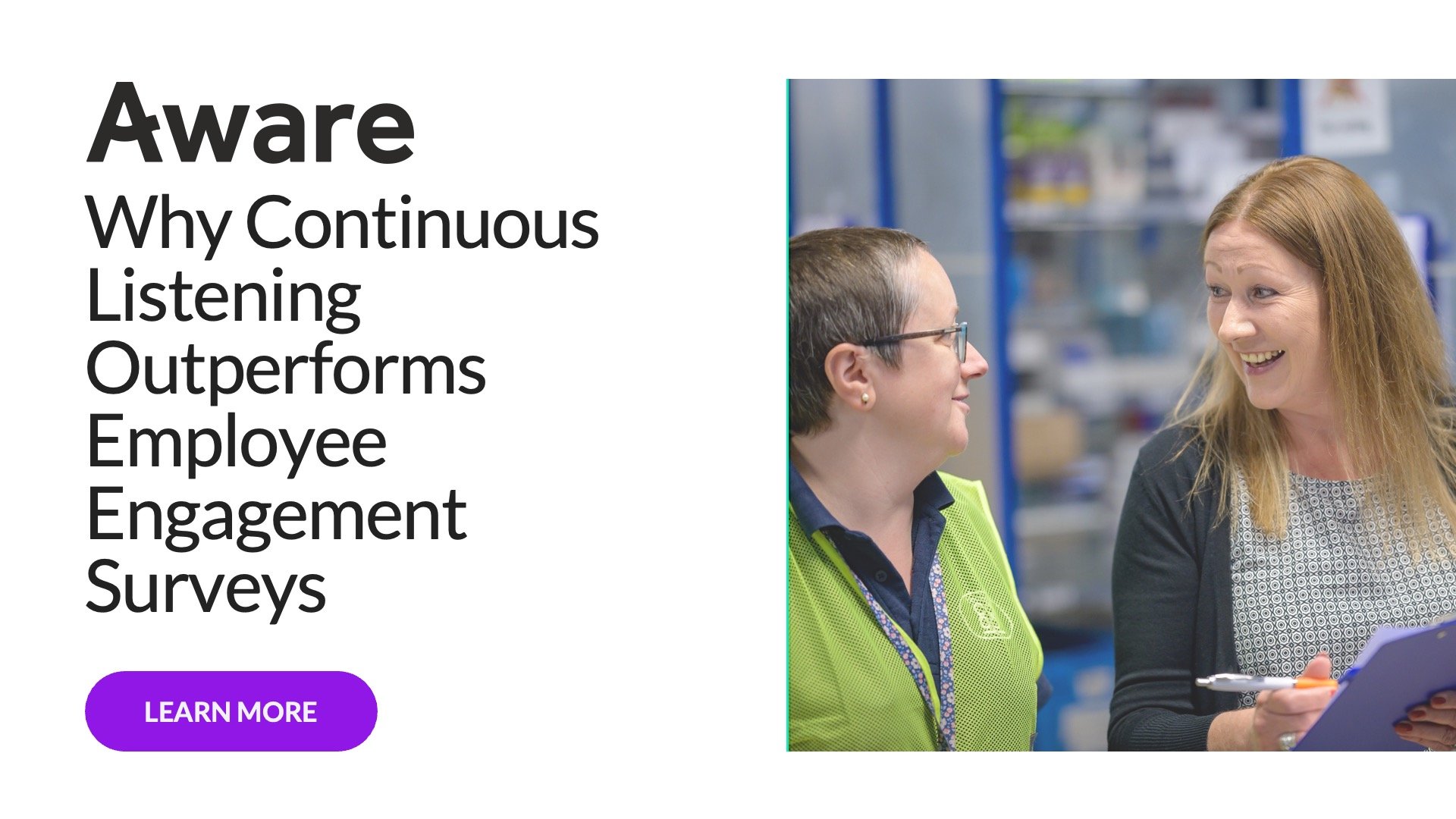
Read more: The power of continuous listening
How top companies leverage sentiment analysis to create business value
Leading companies can harness sentiment analysis to derive substantial value across the enterprise by using insights to improve decision-making, employee engagement, and customer satisfaction.
- A global pharmaceutical company with Ukrainian and Russian operations used employee listening to support employees during the outbreak of hostilities. Read more.
- A telecoms giant relied on sentiment analysis to reduce call center employee burnout. Read more.
- Thanks to sentiment analysis, this healthcare provider gave better support to their staff during Covid. Read more.
- This large retailer made their employee recognition program more inclusive by using sentiment analysis to ensure they considered all voices equally. Read more.
How does Slack sentiment analysis work?
The process of Slack sentiment analysis involves several steps:
- Data Extraction: Connecting to Slack APIs to extract data from conversations within Slack channels.
- Data Cleaning and Preparation: Irrelevant and low-quality information is removed, ensuring that the data is streamlined for analysis.
- Natural Language Processing (NLP): NLP tools enable machines to understand and analyze human speech.
- Sentiment Identification: Using NLP, the sentiment of each message is scored—whether it's positive, negative, or neutral.
- Visualization and Reporting: The results of the sentiment analysis are aggregated and reported, providing insights into employee sentiment.
Does sentiment analysis have any limitations?
NLP-driven sentiment analysis is a powerful tool, but it isn’t infallible. Human perception of sentiment within written text is itself open to debate—it isn’t always possible to tell unanimously if a message is positive or negative in sentiment, especially if sarcasm or humor are in play.
When relying only on our interpretation of written language, humans disagree about the sentiment of messages about 15% of the time, according to research by Aware data scientists. We use punctuation, emojis, memes, slang, and common phrases to help us convey meaning in Slack and other written forums, and that means any natural language processing AI being used to analyze sentiment must also be able to analyze those elements of written speech. Ultimately, any sentiment analysis model is only as good as the NLP that feeds it.
The context in which messages are written is also critical to understand. Industry jargon and abbreviations may be misidentified or misunderstood by generic analysis tools, leading to critical gaps in analysis. Normalizing AI, machine learning, and NLP models for industries and individual workplaces is essential to getting authentic feedback on employee sentiment.
It’s also important to regularly refresh NLP models, as language is constantly evolving. Without the ability to understand the very latest slang or cultural references, sentiment analysis cannot be trusted to be completely accurate. For example, the crying laughing emoji (😂) has been one of the most widely used emojis since the early 2010s. However, younger generations are increasingly using the sobbing emoji (😭) or skull emoji (💀) in its place.
Slack sentiment analysis FAQs
What is sentiment analysis in Slack channels?
Sentiment analysis in Slack involves evaluating the emotional tone of messages to gain insights into how employees feel about topics within their workplace.
How is Slack used for analytics?
Slack provides businesses with a massive, real-time dataset of employee experiences and sentiment that can be used to understand how the business is running and make improvements using tools like Aware.
How do I analyze Slack app data?
Aware enables executives to analyze Slack data by ingesting data and providing sentiment analysis in real time.
Do Slack analytics include DMs?
The scope of Slack analytics depends on the tools used. Within Aware, sentiment analysis and verbatims are drawn from public channel messages.
How do I know if Slack is being monitored?
Organizations typically communicate their Slack workspace monitoring policies, and tools like Aware operate transparently within these guidelines to safeguard employee data.
How do I find the sentiment of a Slack message?
Aware delivers continuous sentiment insights from Slack and other collaboration tool messages from a centralized AI data platform.
What are the benefits of sentiment analysis for Slack?
Sentiment analysis in Slack provides real-time insights into employee sentiments, fostering a positive work environment, improving policies and processes, and enhancing communications at every level.
How do I track Slack sentiment analysis?
Slack sentiment analysis is available through tools like Aware, which uses industry-leading NLP technology to score Slack messages and deliver sentiment insights in real time.
Slack sentiment analysis from Aware
Aware provides innovative companies with sentiment analysis for Slack in English and Spanish to support employee listening strategies, improve operational workflows, and enhance the employee experience. By connecting seamlessly to Slack via APIs and webhooks, Aware ingests collaboration data in real time without impacting the end user experience. Then, Aware’s proprietary natural language processing models analyze each message, scoring it for sentiment and toxicity, as well as performing security checks to shield sensitive and valuable data from exfiltration.
The models Aware deploys were purpose built for this dataset and trained on billions of real collaboration messages to provide the most accurate sentiment analysis available. Aware’s models routinely perform at near-human benchmark and are normalized and refined for each individual workplace to provide actionable, trustworthy insights.
With Aware, leaders can take the real-time pulse of their organization, or understand shifts in sentiment over time. This dynamic view enables a proactive approach to supporting and guiding company culture, surfacing instances of bullying, harassment, and toxicity before they become widespread problems, and improving messaging from the top down and from the breakroom to the boardroom. The result? A more engaged and productive workforce that feels heard and valued by their organization.
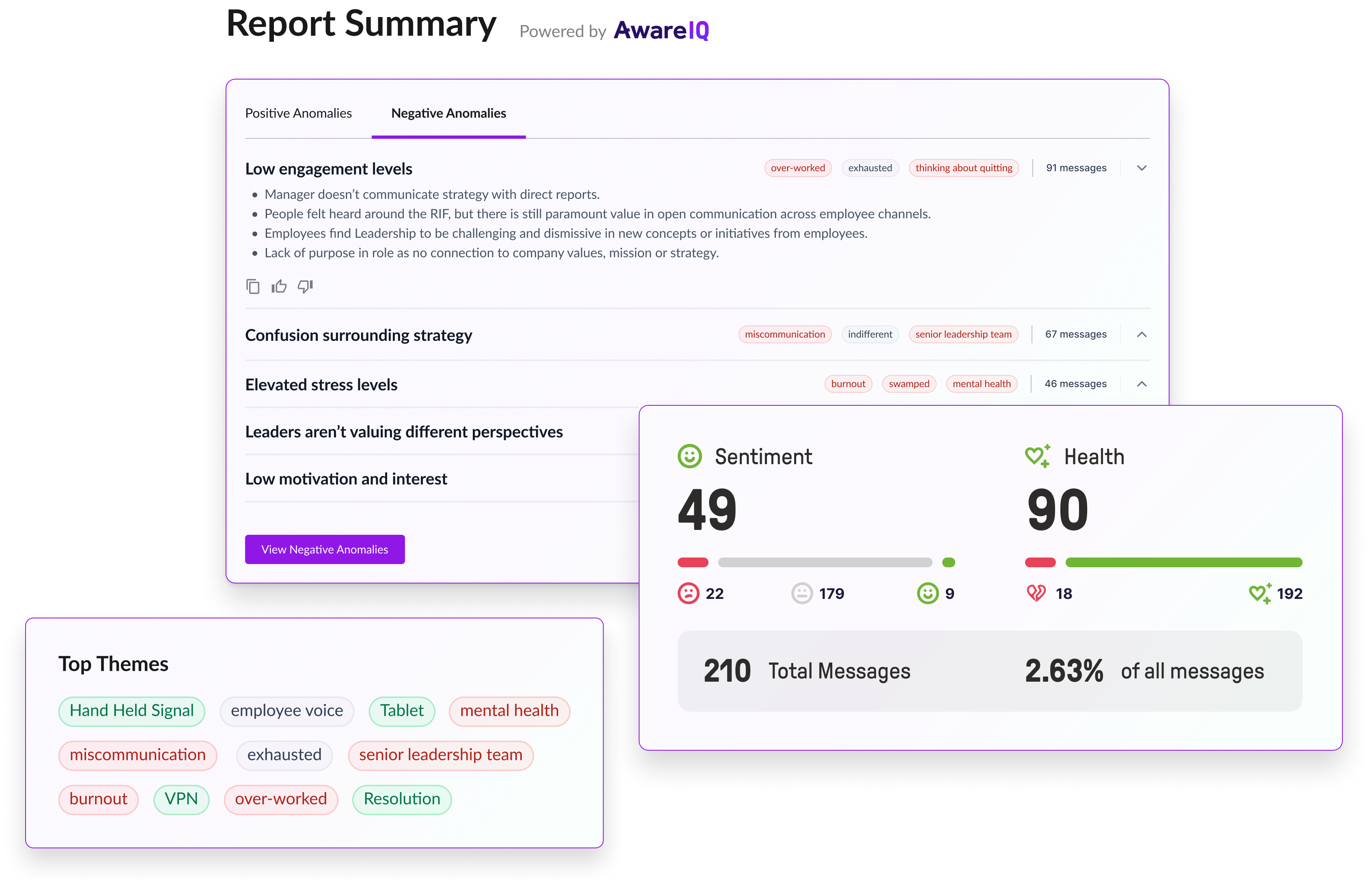
Learn more about how Aware supports employee experience teams
Aware + Slack: Sentiment and security solution
Aware is the only Slack vendor approved for data loss prevention (DLP) and eDiscovery use cases. Aware’s real-time ingestion captures a complete record of Slack messages, including revisions and deletions, and stores them in a search-ready archive enhanced with AI-infused metadata. This enables compliance teams to check the box on data retention requirements, while legal officers can perform effortless discovery, making sense of JSON files, expediting early case assessment and supporting internal investigations.
Make sense of Slack JSON exports today.
Powered by the industry’s most accurate NLP, Aware captures more instances of data risk with fewer false positives, identifying unauthorized sharing of PII/PHI/PCI, IP, and other sensitive and proprietary data and mitigating them in real time. The Aware Workflow Library further enhances these capabilities by connecting to existing workflows for legal, compliance, security, IT, HR, and other officers to automate actions based on trigger events.
From coaching employees on acceptable use policies to proactively preventing data loss, Aware for Slack protects and secures the digital workplace while elevating the voice of the employee.
